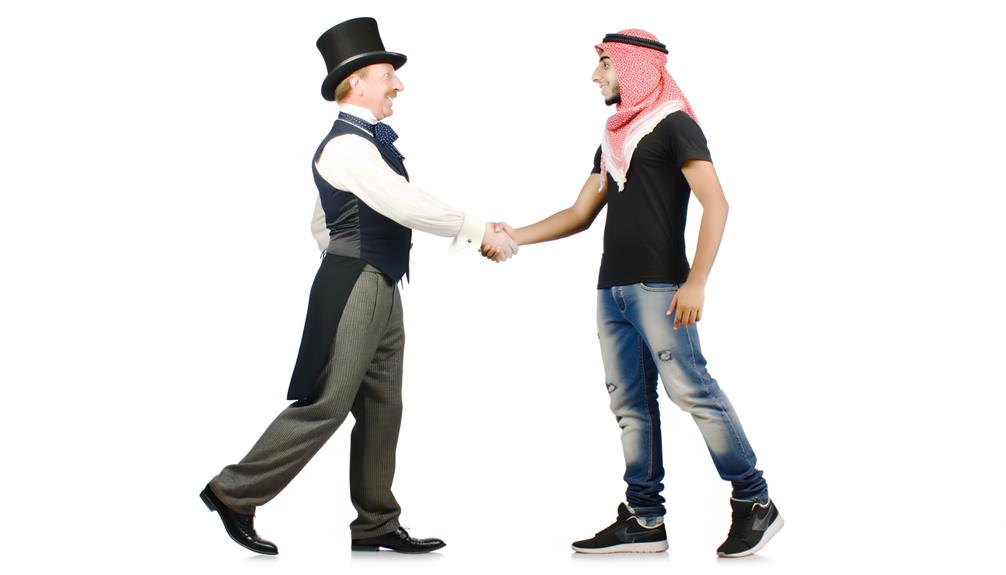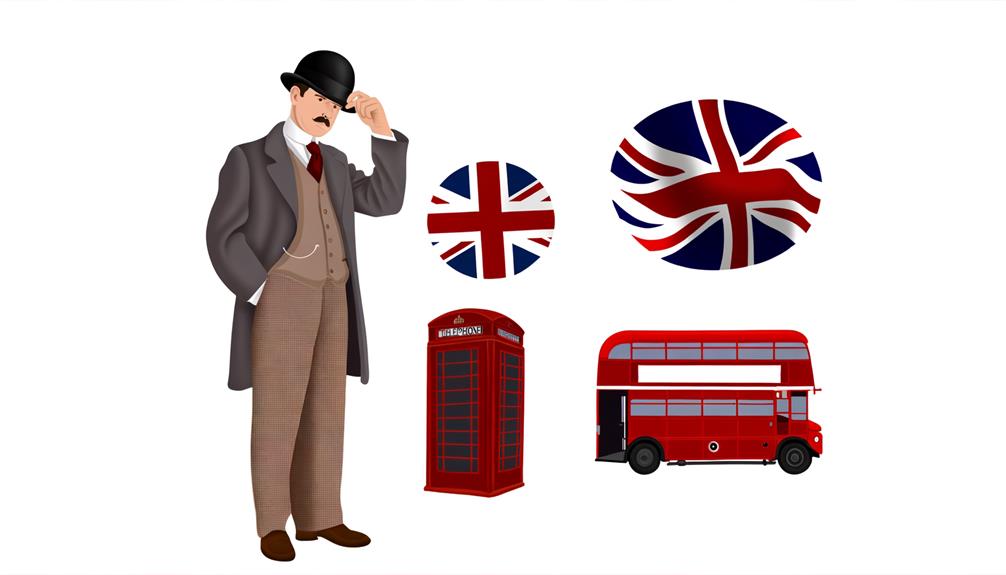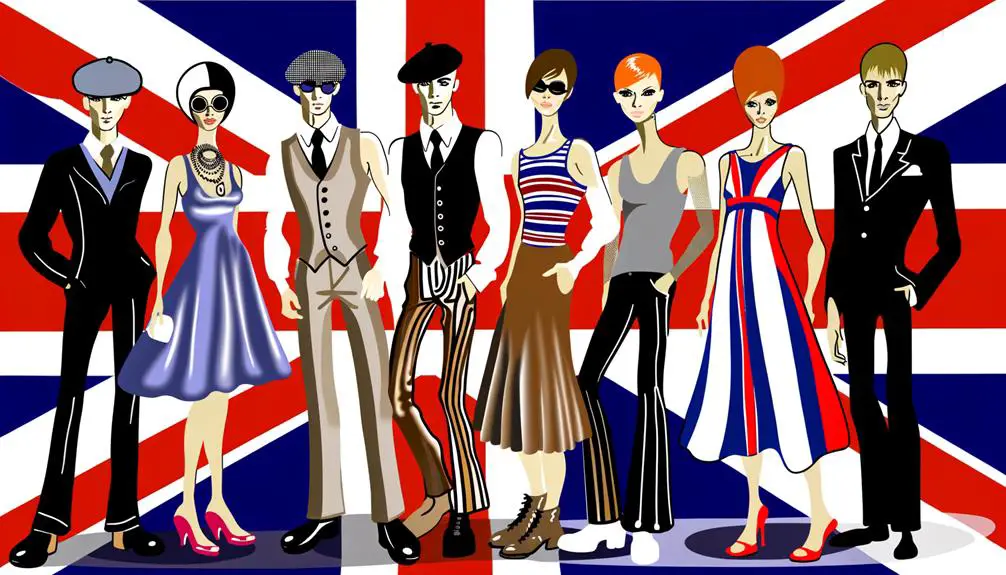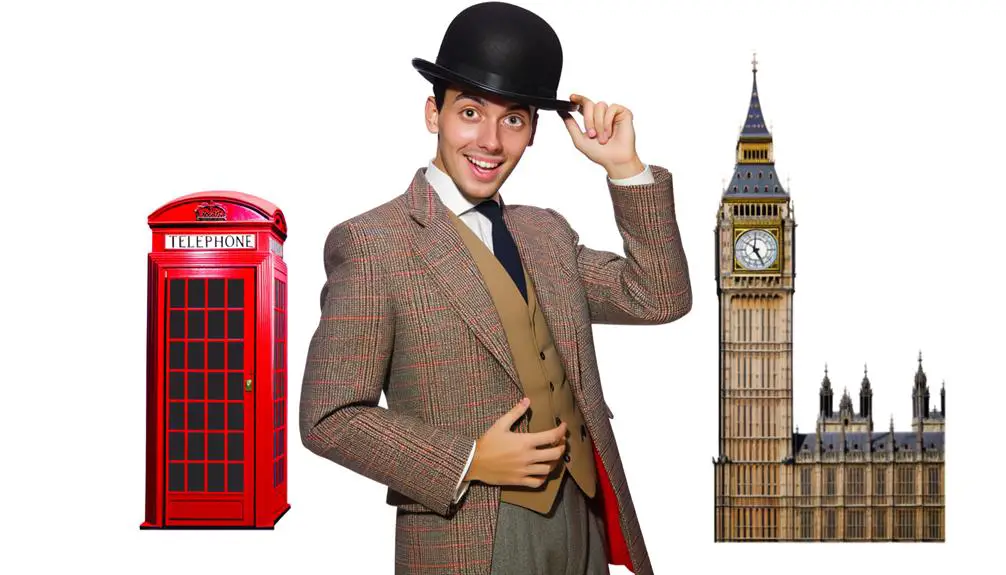In British slang, 'chap' refers to a man or a fellow, showcasing the term's linguistic voyage from Old English 'ceap,' meaning a market or bargain, to its modern connotations. This evolution reflects broader cultural adaptations, where 'chap' has morphed to depict varying social meanings within different UK regions. It's colloquially used to denote a sense of familiarity or camaraderie, especially in Northern England, while carrying distinctive class and gender implications. The term encapsulates the quintessential British gentleman persona, shifting from upper-class usage to a more inclusive expression of respectability. Revealing the facets of 'chap' exposes its rooted significance in British identity and societal norms.
Key Takeaways
- In British slang, 'chap' refers to a man or fellow, often used colloquially.
- It carries connotations of politeness and respectability, reflecting a gentlemanly persona.
- The term has evolved from its early trade-related origins to denote familiarity or camaraderie.
- Usage varies across regions in the UK, with nuanced meanings in Northern England, Scotland, and Wales.
- 'Chap' is also associated with traditional British characters in media, representing traits like politeness and traditional attire.
The Origin of 'Chap'

The term 'chap' has its roots in the early 16th century, evolving from the Old English 'ceap', meaning 'a market' or 'a bargain', reflecting its historical context in trade and transaction. This origin is pivotal in understanding the etymological debates surrounding 'chap', as it underscores the word's transformation from a noun associated with commerce to its contemporary use as a descriptor for a man or fellow. The linguistic evolution of 'chap' is a classic example of how words shift in meaning and usage over time, adapting to the changing landscapes of language and society.
Your exploration into the etymology of 'chap' reveals the complexities of linguistic evolution. It's not merely about the alteration of meanings but also about the cultural and social dynamics that influence such changes. As you investigate the etymological debates, you'll find that 'chap' embodies more than a simple lexical shift; it encapsulates a journey through time, reflecting various facets of human interaction, commerce, and social identity. This analytical journey offers a precise understanding of how language evolves, highlighting the importance of context, both historical and cultural, in shaping the words we use today.
'Chap' in Modern Usage
Having explored its etymological journey, it's now clear how 'chap' has morphed into a term that colloquially refers to a man or fellow in modern contexts. This evolution speaks volumes about its importance and adaptability in the ever-changing landscape of language. Today, your understanding of 'chap' can't be complete without grasping its current perceptions and the social implications it carries.
The term 'chap' is now often imbued with a sense of familiarity and informality, suggesting a certain level of camaraderie or friendship when you refer to someone as such. It's not just a reference to any man but often conveys a hint of affection or at least benign acknowledgment. However, it's essential to note that its usage can vary significantly across different social groups and regions within the UK, reflecting the diverse linguistic fabric of the country.
In analyzing its modern usage, it's evident that 'chap' also carries with it an undercurrent of traditional or even quaint masculinity. This aspect has social implications, subtly reinforcing certain stereotypes or expectations of male behavior and demeanor. As you navigate through the nuances of British slang, understanding the layered meanings and contexts of 'chap' offers insightful glimpses into contemporary British culture and social dynamics.
Cultural Significance

Delving into the cultural significance of 'chap', it's clear you're exploring a term that resonates deeply within British society, reflecting both historical nuances and contemporary identities. The word 'chap' carries with it an air of familiarity yet is layered with intricate gender implications and social class distinctions. It's not just a casual term for 'man' or 'guy'; it's a marker of a certain persona, often tied to the quintessentially British gentleman, evoking images of politeness, tailored suits, and a certain debonair charm.
| Era | Gender Implications | Social Class Distinctions |
|---|---|---|
| 19th Century | Masculinity Ideal | Upper Class |
| Early 20th Century | Gentlemanly Conduct | Middle/Upper Class |
| Post-War | Evolving Masculinity | Blurred Lines |
| Late 20th Century | Broader Usage | Less Defined |
| 21st Century | Casual, Yet Respectful | All Classes |
This table encapsulates the evolution of 'chap', highlighting how its usage has shifted from a strict upper-class terminology to a more inclusive term, albeit still carrying an air of respect and a nod to traditional British values. The term's adaptability and enduring appeal underscore its significant role in the fabric of British cultural identity, moving through changing societal norms while preserving its essence.
Regional Variations
Across the United Kingdom, you'll find that 'chap' takes on nuanced meanings, reflecting the diverse cultural landscape of its regions. The term, deeply rooted in English culture, showcases a rich tapestry of dialectical differences and pronunciation variations, which highlight the complexity of British slang. Understanding these regional variations not only enriches your comprehension of the word but also offers a fascinating insight into the socio-linguistic fabric of the UK.
- Northern England: In the north, 'chap' often bears a warmer, more colloquial tone, used to denote familiarity and camaraderie among men.
- Scotland: The pronunciation thickens, rolling off the tongue with a distinctly Scottish lilt. Here, 'chap' can sometimes extend beyond referring to men, embracing a broader, more inclusive community spirit.
- Wales: Welsh speakers might inflect 'chap' with a musicality unique to the Welsh accent, occasionally substituting it with local Welsh equivalents in casual conversation.
- South West England: In this region, 'chap' is not only a term of endearment but also can carry a hint of respect or admiration, pronounced with the soft rhotic accent typical of the area.
These dialectical differences and pronunciation variations across regions underscore the term's adaptability and the rich linguistic diversity within the UK.
Famous Chaps in Media

Exploring the regional variations of 'chap' sets the stage for understanding its prominence in media, where numerous characters have been affectionately dubbed or embody the quintessential 'chap'. These characters, mainly from British media, showcase the evolution of chap stereotypes through their portrayal. They range from the impeccably dressed gentlemen of early 20th-century literature to the more nuanced, complex characters seen in contemporary films and TV shows.
The representation of fictional chaps in media often plays with the stereotypes associated with the term, such as politeness, a penchant for traditional attire, and a certain unflappability in the face of adversity. These characters contribute to the international understanding and appreciation of the chap archetype.
Here's a glance at some of the famous chaps in media:
| Character Name | Medium | Chap Stereotype |
|---|---|---|
| Bertie Wooster | Literature/TV | The quintessential gentleman |
| James Bond | Film | The suave spy |
| Sherlock Holmes | Literature/Film/TV | The eccentric detective |
| Arthur Dent | Literature/Film | The everyman in extraordinary circumstances |
These characters illustrate the versatility of the chap concept, transcending mere caricature to become icons in their own right, each representing different facets of what it means to be a chap in the world of fiction.







